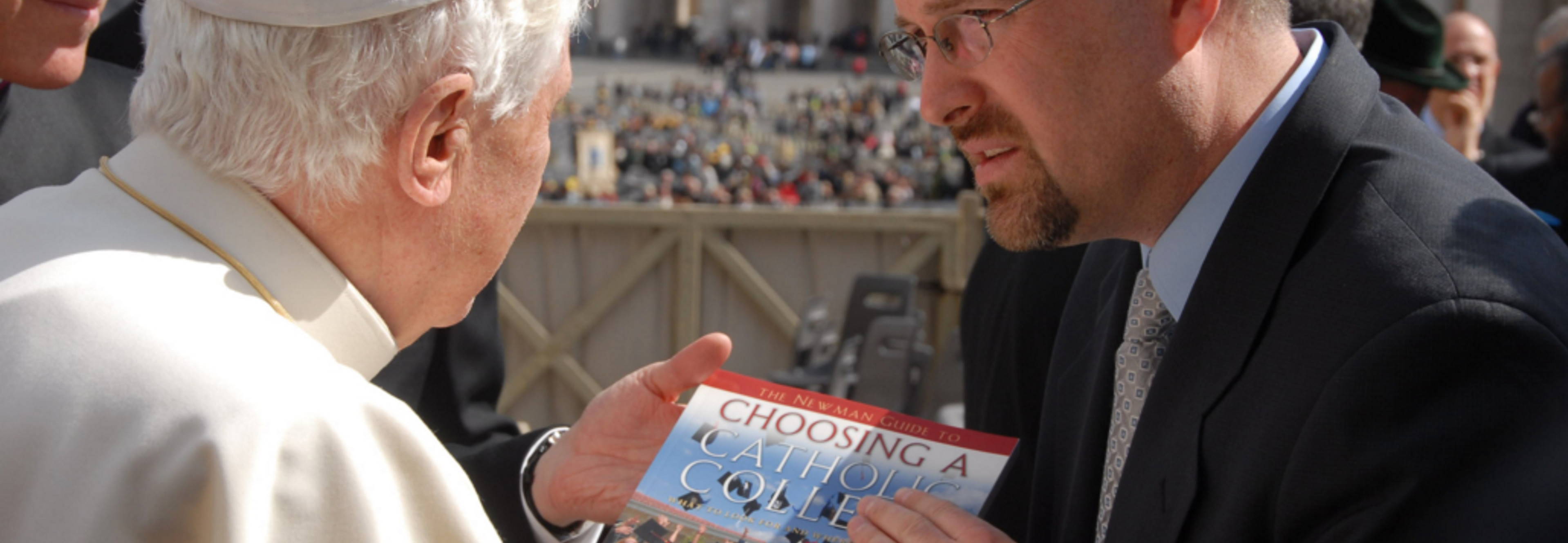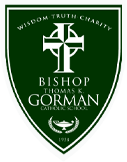
Principle I: Inspired by Divine Mission
Catholic education is an expression of the Church’s mission of salvation and an instrument of evangelization:1 to make disciples of Christ and to teach them to observe all that He has commanded.2 Through Catholic education, students encounter God, “who in Jesus Christ reveals His transforming love and truth.”3 Christ is the foundation of Catholic education;4 He journeys with students through school and life as “genuine Teacher” and “perfect Man.”5 As a faith community in unity with the Church and in fidelity to the Magisterium, students, parents, and educators give witness to Christ’s loving communion in the Holy Trinity.6 With this Christian vision, Catholic education fulfills its purpose of “critical, systematic transmission of culture in the light of faith”7 and the integral formation of the human person by developing each student’s physical, moral, intellectual, and spiritual gifts in harmony, teaching responsibility and right use of freedom, and preparing students to fulfill God’s calling in this world and to attain the eternal kingdom for which they were created.8 Catholic education is sustained by the frequent experience of prayer, Sacred Scripture, and the Church’s liturgical and sacramental tradition.9
Principle II: Models Christian Communion and Identity
Catholic education teaches communion with Christ, by living communion with Christ and imitating the love and freedom of the Trinity.10 This communion begins in the home—with the divinely ordered right and responsibility of parents to educate their children—and extends to the school community in support and service to the needs of the family.11 It unites families and educators with a shared educational philosophy to form students for a relationship with God and with others.12 The educational community is united to the universal Church in fidelity to the Magisterium, to the local Church, and to other schools and community organizations.13
The school community is a place of ecclesial experience, in which the members model confident and joyful public witness in both word and action and teach students to live the Catholic faith in their daily lives.14 In an environment “humanly and spiritually rich,” everyone is aware of the living presence of Jesus evidenced by a Christian way of thought and life, expressed in “Word and Sacrament, in individual behavior, [and] in friendly and harmonious interpersonal relationships.”15 The school climate reproduces, as far as possible, the “warm and intimate atmosphere of family life.”16 As members of the Church community, students experience what it means to live a life of prayer, personal responsibility, and freedom reflective of Gospel values. This, in turn, leads them to grow in their commitment to serve God, one another, the Church, and society.17
All teachers and leaders possess adequate skills, preparation, and religious formation and possess special qualities of mind and heart as well as the sensitivity necessary for authentic witness to the gospel and the task of human formation.18 Teachers and leaders of the educational community should be “practicing Catholics, who can understand and accept the teachings of the Catholic Church and the moral demands of the Gospel, and who can contribute to the achievement of the school’s Catholic identity and apostolic goals.”19
Principle III: Encounters Christ in Prayer, Scripture & Sacrament
Rooted in Christ, Catholic education is continually fed and stimulated by Him in the frequent experience of prayer, Sacred Scripture, and the Church’s liturgical and sacramental tradition.20 The transmission of faith, catechesis, is intrinsically linked to these living encounters with Christ, by which He nurtures and educates souls in the divine life of grace and the gifts of the Holy Spirit.21 By their witness and sharing in these encounters, educators help students grow in understanding of what it means to be a member of the Church.22 Students discover the real value of the Sacraments, especially the Eucharist and Reconciliation, in accompanying the Christian in the journey through life. They learn “to open their hearts in confidence to Father, Son, and Holy Spirit through personal and liturgical prayer”, which makes the mystery of Christ present to students.23
Principle IV: Integrally Forms the Human Person
A complex task of Catholic education is the integral formation of students as physical, intellectual, and spiritual beings called to perfect humanity in the fullness of Christ.24 The human person is “created in ‘the image and likeness’ of God; elevated by God to the dignity of a child of God; unfaithful to God in original sin, but redeemed by Christ; a temple of the Holy Spirit; a member of the Church; destined to eternal life.”25 Catholic education assists students to become aware of the gift of Faith, worship God the Father, develop into mature adults who bear witness to the Mystical Body of Christ, respect the dignity of the human person, provide service, lead apostolic lives, and build the Kingdom of God.26
Catholic education forms the conscience through commitment to authentic Catholic doctrine. It develops the virtues and characteristics associated with what it means to be Christian so as to resist relativism, overcome individualism, and discover vocations to serve God and others.27 “Intellectual development and growth as a Christian go forward hand in hand” where faith, culture, and life are integrated throughout the school’s program to provide students a personal closeness to Christ enriched by virtues, values, and supernatural gifts.28 As a child of God, made in his image, human formation includes the development of personal Christian ethics and respect for the body by promoting healthy development, physical activity, and chastity.29
In Catholic education, “There is no separation between time for learning and time for formation, between acquiring notions and growing in wisdom”; education and pedagogy, inspired by Gospel values and distinguished by the “illumination of all knowledge with the light of faith” allows formation to become living, conscious and active.30 The atmosphere is characterized by discovery and awareness that enkindles a love for truth and a desire to know the universe as God’s creation. The Christian educational program facilitates critical thinking that is ordered, precise, and responsible as it builds strength and perseverance in pursuit of the truth. 31
Principle V: Imparts a Christian Understanding of the World
In the light of faith, Catholic education critically and systematically transmits the secular and religious “cultural patrimony handed down from previous generations,” especially that which makes a person more human and contributes to the integral formation of students.32 Both educator and student are called to participate in the dialogue of culture and to pursue “the integration of culture with faith and of faith with living.”33 Catholic education imparts “a Christian vision of the world, of life, of culture, and of history,” ordering “the whole of human culture to the news of salvation.”34 This hallmark of Catholic education, to “bring human wisdom into an encounter with divine wisdom,”35 cultivates “in students the intellectual, creative, and aesthetic faculties of the human person,” introduces a cultural heritage, and prepares them for professional life and to take on the responsibilities and duties of society and the Church.36 Students are prepared to work for the evangelization of culture and for the common good of society.37
The five principles of Catholic Identity are from The Cardinal Newman Society.

